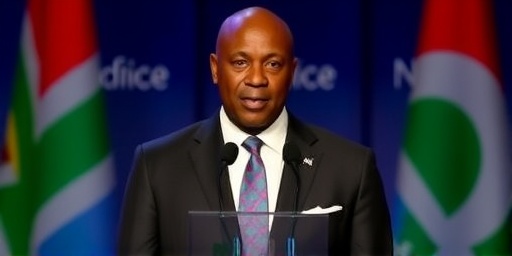In a impassioned address at the ongoing G20 summit in Johannesburg, South African President Cyril Ramaphosa has lambasted the escalating Wealth gap and development disparities between nations, labeling them as “unjust and unsustainable.” His remarks, delivered on the summit’s second day, have ignited debates among world leaders, spotlighting the urgent need to tackle economic inequality on a global scale.
- Ramaphosa’s Fiery Critique Highlights Africa’s Struggles Amid Global Prosperity
- Stark Data Reveals Widening Global Wealth Disparities at G20 Discussions
- World Leaders Grapple with Ramaphosa’s Push for G20 Economic Overhaul
- Emerging Proposals Aim to Bridge Development Divides Post-Ramaphosa’s Address
- Horizons for Global Reform: What Lies Ahead After G20’s Inequality Wake-Up
Ramaphosa, representing one of Africa’s largest economies, emphasized that the current global financial architecture perpetuates a cycle of poverty for developing nations while enriching the already prosperous. “We cannot continue to watch as a handful of countries hoard the world’s resources while billions languish in poverty,” he declared, drawing applause from delegates from emerging markets. This bold stance comes amid heightened tensions over trade policies and climate finance, setting the tone for what could be a pivotal moment in international economic cooperation.
Ramaphosa’s Fiery Critique Highlights Africa’s Struggles Amid Global Prosperity
President Ramaphosa’s speech was more than rhetoric; it was a clarion call rooted in the stark realities faced by African nations. He pointed to South Africa’s own challenges, where unemployment hovers around 33% and youth joblessness exceeds 60%, as microcosms of broader development failures. “The G20, meant to foster inclusive growth, has instead become a club that widens the chasm between the haves and have-nots,” Ramaphosa stated, urging a reevaluation of institutions like the IMF and World Bank.
Delving deeper, Ramaphosa referenced recent data from the World Bank, which shows that the richest 10% of the global population controls over 76% of the world’s wealth, while the bottom 50% holds just 2%. In Africa, this Wealth gap manifests in crumbling infrastructure and limited access to education and healthcare. For instance, sub-Saharan Africa receives only 0.5% of global foreign direct investment despite comprising 14% of the world’s population. Ramaphosa argued that such imbalances not only stifle development but also fuel social unrest, citing recent protests in countries like Nigeria and Kenya over economic policies.
His address also touched on historical injustices, including the legacy of colonialism and unfair trade deals that continue to disadvantage developing economies. “Economic inequality is not an accident; it’s a design flaw in the global system,” he asserted, calling for debt relief and fairer resource allocation. This perspective resonated with representatives from Brazil and India, who nodded in agreement, signaling potential alliances among BRICS nations within the G20 framework.
Stark Data Reveals Widening Global Wealth Disparities at G20 Discussions
As Ramaphosa’s words hung in the air, the summit panels shifted focus to hard numbers underscoring the Wealth gap. According to a new report released by Oxfam during the event, the world’s billionaires have seen their fortunes surge by $3.3 trillion since 2020, even as 99% of the global population grappled with inflation and stagnant wages. This disparity is particularly acute in the Global South, where GDP per capita in low-income countries lags behind high-income ones by a factor of 20.
Experts at the G20 highlighted specific sectors exacerbating economic inequality. In agriculture, for example, subsidies in wealthy nations like the US and EU total $600 billion annually, undercutting farmers in Africa and Asia. Ramaphosa echoed this, noting that South Africa’s agricultural exports face tariffs that make market access nearly impossible. “Development aid is a bandage on a gaping wound; we need systemic surgery,” he quipped, prompting murmurs of support from delegates.
Further statistics painted a grim picture: The UN estimates that closing the wealth gap could eradicate extreme poverty by 2030, yet current trajectories suggest an additional 100 million people could slip into destitution by 2025 due to climate change and economic shocks. Panel discussions featured economists like Nobel laureate Joseph Stiglitz, who praised Ramaphosa’s intervention as “a wake-up call for complacent leaders.” Stiglitz added, “The G20 must prioritize progressive taxation and technology transfer to bridge this divide.”
To illustrate the human cost, speakers shared anecdotes from affected communities. In rural South Africa, for instance, families walk miles for water while urban elites enjoy luxury lifestyles funded by multinational corporations. Such stories underscored Ramaphosa’s point that economic inequality isn’t abstract—it’s a daily barrier to opportunity.
World Leaders Grapple with Ramaphosa’s Push for G20 Economic Overhaul
Ramaphosa’s critique didn’t go unchallenged, sparking a range of responses from G20 counterparts. US President Joe Biden acknowledged the concerns but defended existing aid programs, stating, “We’re committed to equitable growth, but reforms must be multilateral.” Meanwhile, China’s Xi Jinping, speaking virtually, supported calls for a “more balanced global order,” aligning with Ramaphosa’s vision of reformed international financial institutions.
European leaders, including Germany’s Olaf Scholz, expressed willingness to discuss increasing climate finance for developing nations, potentially tripling commitments to $100 billion annually. However, tensions arose over intellectual property rights, with Ramaphosa advocating for waived patents on green technologies to accelerate development in poorer countries. “Why should Africa pay premium prices for solutions we desperately need?” he challenged, highlighting how such barriers widen the wealth gap.
The summit saw side meetings where African Union representatives, led by Ramaphosa, proposed a “Global Equity Pact.” This initiative includes debt moratoriums for low-income countries, increased official development assistance to 0.7% of GNI, and a tax on luxury goods to fund development projects. Indian Prime Minister Narendra Modi endorsed the pact, noting its potential to address economic inequality through South-South cooperation.
Critics, however, warned of implementation hurdles. A spokesperson for the UK Treasury cautioned that radical reforms could destabilize markets, but Ramaphosa countered, “The real instability comes from inaction—riots in the streets of Johannesburg are a preview of what’s to come globally.” These exchanges underscored the G20‘s role as a battleground for competing visions of economic justice.
Emerging Proposals Aim to Bridge Development Divides Post-Ramaphosa’s Address
Beyond rhetoric, the G20 summit has begun yielding concrete proposals to combat the wealth gap. One key initiative is the establishment of a “Development Equity Fund,” seeded with $50 billion from member contributions, targeted at infrastructure in underserved regions. Ramaphosa championed this, linking it to his nation’s post-apartheid reconstruction efforts, which have lifted millions out of poverty but still face hurdles from economic inequality.
Discussions also covered digital divides, with calls for affordable internet access in Africa to enable remote work and e-commerce. The African Continental Free Trade Area (AfCFTA), endorsed by Ramaphosa, was hailed as a model for intra-regional development, potentially adding $450 billion to Africa’s GDP by 2035. Experts predict that integrating AfCFTA with G20 trade policies could halve the continent’s wealth gap with the North.
Environmental justice emerged as another pillar, with Ramaphosa tying climate vulnerability to economic woes. “Developing nations bear the brunt of a crisis they didn’t create,” he said, pushing for loss-and-damage funds at the upcoming COP29. This holistic approach—blending finance, trade, and sustainability—signals a shift toward inclusive G20 agendas.
Non-governmental organizations like ActionAid praised Ramaphosa’s leadership, with director Fatima Hassan stating, “His voice amplifies the silenced majority, forcing the G20 to confront economic inequality head-on.” Yet, challenges remain, including geopolitical rivalries that could derail consensus.
Horizons for Global Reform: What Lies Ahead After G20’s Inequality Wake-Up
As the Johannesburg G20 summit progresses, Ramaphosa’s intervention has undeniably altered the conversation, paving the way for actionable reforms. Upcoming working groups will draft a communique on wealth gap mitigation, with commitments expected by year’s end. This could include binding targets for aid disbursement and corporate tax harmonization to curb profit shifting that exacerbates economic inequality.
Looking forward, analysts foresee a ripple effect on bilateral relations. South Africa’s influence may bolster Africa’s bargaining power in future forums, potentially leading to increased investments in renewable energy and education. Ramaphosa himself hinted at follow-up summits focused on development, stating, “This is just the beginning; true change demands sustained effort from all G20 partners.”
For developing nations, the stakes are existential. Bridging the wealth gap could unlock trillions in economic potential, fostering stability and innovation. As delegates depart Johannesburg, the world watches to see if words translate into deeds, with Ramaphosa’s legacy hinging on whether the global elite heeds his urgent plea. The path ahead is fraught but promising, offering a chance to redefine prosperity for all.








